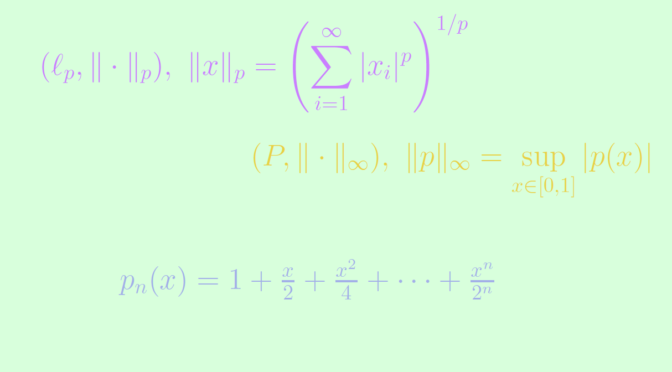Consider a real normed vector space \(V\). \(V\) is called complete if every Cauchy sequence in \(V\) converges in \(V\). A complete normed vector space is also called a Banach space.
A finite dimensional vector space is complete. This is a consequence of a theorem stating that all norms on finite dimensional vector spaces are equivalent.
There are many examples of Banach spaces with infinite dimension like \((\ell_p, \Vert \cdot \Vert_p)\) the space of real sequences endowed with the norm \(\displaystyle \Vert x \Vert_p = \left( \sum_{i=1}^\infty \vert x_i \vert^p \right)^{1/p}\) for \(p \ge 1\), the space \((C(X), \Vert \cdot \Vert)\) of real continuous functions on a compact Hausdorff space \(X\) endowed with the norm \(\displaystyle \Vert f \Vert = \sup\limits_{x \in X} \vert f(x) \vert\) or the Lebesgue space \((L^1(\mathbb R), \Vert \cdot \Vert_1)\) of Lebesgue real integrable functions endowed with the norm \(\displaystyle \Vert f \Vert = \int_{\mathbb R} \vert f(x) \vert \ dx\).
Let’s give an example of a non complete normed vector space. Let \((P, \Vert \cdot \Vert_\infty)\) be the normed vector space of real polynomials endowed with the norm \(\displaystyle \Vert p \Vert_\infty = \sup\limits_{x \in [0,1]} \vert p(x) \vert\). Consider the sequence of polynomials \((p_n)\) defined by
\[p_n(x) = 1 + \frac{x}{2} + \frac{x^2}{4} + \cdots + \frac{x^n}{2^n} = \sum_{k=0}^{n} \frac{x^k}{2^k}.\] For \(m < n \) and \(x \in [0,1]\), we have
\[\vert p_n(x) - p_m(x) \vert = \left\vert \sum_{i=m+1}^n \frac{x^i}{2^i} \right\vert \le \sum_{i=m+1}^n \frac{1}{2^i} \le \frac{1}{2^m}\] which proves that \((p_n)\) is a Cauchy sequence. Also for \(x \in [0,1]\) \[
\lim\limits_{n \to \infty} p_n(x) = p(x) \text{ where } p(x) = \frac{1}{1 - \frac{x}{2}}.\] As uniform converge implies pointwise convergence, if \((p_n)\) was convergent in \(P\), it would be towards \(p\). But \(p\) is not a polynomial function as none of its \(n\)th-derivative always vanishes. Hence \((p_n)\) is a Cauchy sequence that doesn't converge in \((P, \Vert \cdot \Vert_\infty)\), proving as desired that this normed vector space is not complete.
More generally, a normed vector space with countable dimension is never complete. This can be proven using Baire category theorem which states that a non-empty complete metric space is not the countable union of nowhere-dense closed sets.

